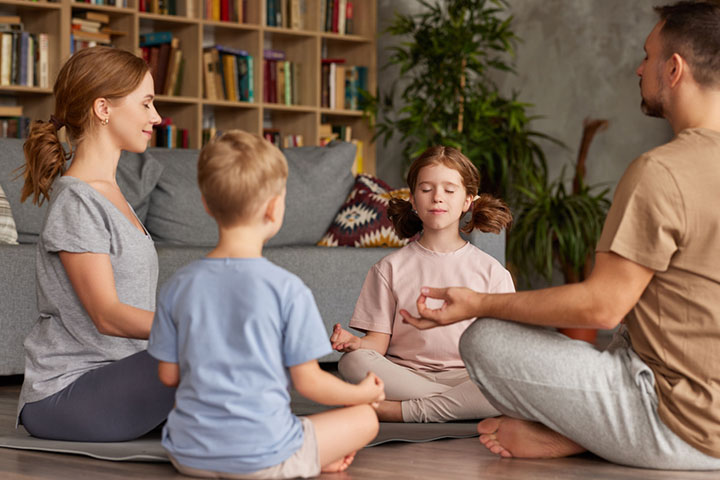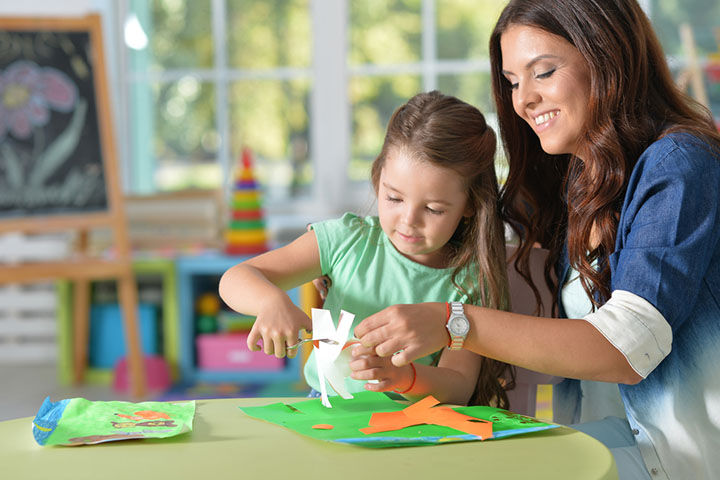
Image: Shutterstock
As parents, we play a pivotal role in shaping our children’s lives, and this includes their mental well-being. By modeling good mental health practices, we can instill lifelong habits in our children that promote emotional resilience and well-being. In this article, we’ll explore some simple yet effective ways to model positive mental health practices for your kids, fostering a healthy mindset that will benefit them throughout their lives. Read on!
1. Make Breathing Exercises A Norm
Image: Shutterstock
Teaching your kids simple breathing exercises can be a powerful tool for managing stress and anxiety. Deep breathing techniques can help calm the mind and reduce emotional turmoil. Make it a family practice to take a few minutes each day to do breathing exercises together.
Start with something as simple as a few deep breaths in and out. You can count to four as you inhale, hold for four, and then exhale slowly to the count of four. As your children become accustomed to this practice, you can explore more advanced techniques like progressive muscle relaxation or guided imagery. By modeling these exercises, you demonstrate the importance of managing stress and emotions in a healthy way.
2. Create A Daily Gratitude Practice
Gratitude is a powerful tool for fostering a positive mindset and improving mental health. Encourage your children to express gratitude daily by sharing what they are thankful for. You can create a gratitude journal as a family, where everyone writes down one thing they are grateful for each day.
By actively participating in this practice, you not only teach your children the value of gratitude but also model it for them. When kids see their parents expressing gratitude regularly, they are more likely to adopt the habit themselves. This simple practice can lead to a more optimistic and resilient outlook on life.
3. Unwind By Doing Some Art
Image: Shutterstock
Engaging in creative activities like art can be therapeutic and a great way to model self-care for your kids. Create art together as a family or encourage your children to express themselves through art independently. Whether it’s drawing, painting, crafting, or even coloring, these activities can be a wonderful way to unwind and de-stress.
When you participate in creative activities as a family, you not only bond but also demonstrate the importance of finding healthy outlets for emotions. It’s a chance to show your children that it’s okay to take a break and indulge in activities that bring joy and relaxation.
4. Go On A Daily Walk
Physical activity has a direct impact on mental health. Regular exercise releases endorphins, which can help reduce stress and improve mood. Make it a family routine to go on a daily walk together. This is an opportunity for quality family time, fresh air, and physical activity.
During these walks, encourage open communication with your children. Use the time to check in with them, ask about their day, and provide a safe space for them to share their feelings and concerns. By being present and attentive, you show them the importance of connecting with loved ones and sharing emotions.
5. Limit Your Screen Time
Image: Shutterstock
Excessive screen time can negatively affect mental health by contributing to feelings of isolation and anxiety. Set healthy boundaries for screen time for both yourself and your children. Make it a family rule to limit screen time during meals and before bedtime.
By adhering to these boundaries yourself, you demonstrate the importance of balance in life. Engage in alternative activities like reading, playing board games, or having meaningful conversations as a family. These interactions can help strengthen bonds and foster a sense of well-being.
6. Create A Designated Self-Care Corner
Designate a special corner in your home as a self-care space for both you and your children. This corner can be a place to unwind, read, meditate, or simply relax. Fill it with items that promote relaxation and self-care, such as books, cozy blankets, soothing music, or a few plants.
By creating this space, you emphasize the significance of taking time for oneself to recharge. Encourage your children to use this space when they need a moment of calm and self-reflection. Modeling self-care practices and providing the tools to do so can help them develop a healthy relationship with self-care as they grow.
7. Practice Mindful Eating
Image: Shutterstock
Mindfulness is a valuable skill for managing stress and improving mental health. Teach your children by practicing it together as a family, incorporating simple exercises like mindful breathing, body scans, or mindful eating into daily routines. During meals, encourage your children to savor each bite, paying attention to the taste, texture, and aroma of their food, and avoiding distractions. This promotes healthy eating habits and emphasizes being present in the moment to enjoy life’s simple pleasures.
Modeling good mental health practices for your kids is a powerful way to instill lifelong habits that promote emotional well-being. By practicing these, you create a nurturing environment where mental health is prioritized. These practices not only benefit your children but also help you maintain your own mental well-being, ultimately fostering a healthy and resilient family dynamic.
















